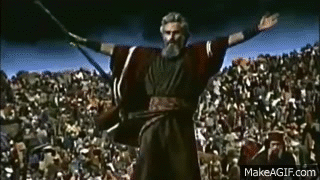The original experience of the signs and miracles may have been overwhelming. But when the Torah repeatedly urges their transmission to the future, in the form of narrative, triumphant simplicities disappear in the dazzle and blur of memory. The question arises: "Whose narrative?" (Avivah Zornberg, The Particulars of Rapture: Reflections on Exodus)
I have been thinking a lot lately about how one deals with people who seem impervious to communication or paying attention to data that might change their minds, or as the Torah puts it, whose "hearts are hardened." Last week, the weekly Torah portion read in Jewish synagogues was chapters 10-13 of Exodus, which covers the last few plagues when Pharaoh's heart is hardened, explicitly by God, as well as the first Passover laws intended to keep the Israelites from suffering the plague of the death of the firstborn. Among these laws is the command to tell this story to future generations of Israelites. Avivah Zornberg, in her commentary to Exodus, discusses this, and suggests that the Biblical narrative includes a kind of subversive subtext of narrative, a way of saying you shouldn't necessarily believe exactly what your eyes have seen (or what your ears have heard). There might be multiple ways of interpreting the events before your eyes - the signs and wonders God accomplished in the Egyptians and Israelites, right before their eyes. Though not right before the eyes of subsequent generations of Israelites, that is, "your child who will ask" what the laws instituted in Ex 12-13 mean. The narrative non-repetitions in the story of the plagues open other possible interpretations.
There are discrepancies and non-repetitions in what, how, and why God says specifically about Pharoah's heart being hardened. In Ex. 7:3-5, the Lord says:
But I will harden Pharaoh’s heart, and I will multiply my signs and wonders in the land of Egypt. 4 When Pharaoh does not listen to you, I will lay my hand upon Egypt and bring my people the Israelites, company by company, out of the land of Egypt by great acts of judgment. 5 The Egyptians shall know that I am the Lord, when I stretch out my hand against Egypt and bring the Israelites out from among them.
In Ex. 10:12, before the 8th plague of the locusts, the Lord says,
Go to Pharaoh; for I have hardened his heart and the heart of his officials, in order that I may show these signs of mine among them, 2 and that you may tell your children and grandchildren how I have made fools of the Egyptians and what signs I have done among them—so that you may know that I am the Lord.
It's not just for the Egyptians to to know, but also so that you - Israelites, including your children and grandchildren- "may know that I am the Lord" - by telling them how He made fools of the Egyptians.
Not exactly what God said earlier.
Moreover, did God Himself harden Pharaoh's heart, or did he harden it himself? Certainly God predicts that he will harden Pharaoh's heart, but does that mean that God was directly responsible for every instance that Pharaoh's heart was hardened? The narrative offers a mixed message: sometime Pharaoh himself, sometimes God hardened it. For the first five plagues, it seems to be Pharaoh himself. Pharaoh is the subject of sentences referring to his hardening his heart; it doesn't say explicitly God hardened it, i.e., 7:22: after the blood plague, "Pharaoh remained obstinate (as the Lord had foretold)"; after the frogs, "he became obdurate as the Lord had foretold;" after the lice, 8:19: "Pharaoh remained obstinate (as the Lord had foretold); and so on after the swarms of flies (8:32), the plague of the animal disease (9:12). Only after the plague of hail, while at first it says Pharoah remained obstinate (9:35), does it say explicitly (with God speaking), that "I have made him [Pharaoh] and his courtiers obdurate" (Ex 10:1), and then after the plague of locusts, "The Lord made Pharaoh obstinate" (10:20), after the plague of darkness, " "the Lord made Pharaoh obstinate" (10:27; 11:9).
So does this break in the pattern suggest that Pharaoh at least at first had free will, and only later did God make him harden his heart? Or did God's foretelling it make it so, as a sort of self-fulfilling prophecy? The non-repetition makes us question who's pulling Pharaoh's strings, or when? Also, in several of Pharaoh's refusals to let the Israelites go, he first assents (sometimes with conditions unacceptable to Moses), and then changes his mind. That sounds more like a flexible, rubbery heart, not an inflexible heart of stone - despite the fact the text says Pharaoh's heart was "hardened."
So this is one set of particularly significant breaks from the repeated pattern of "plague followed by Pharaoh's heart-hardening." This break also parallels more or less another break - plagues affecting all of Egypt, vs. plagues specified as affecting only the Egyptians, and sparing the the Israelites. That sets up the last big break from the pattern, God's legislation of the Passover laws in Ex 12 between the 9th and last plague killing the Egyptians' first born sons. By observing those laws, by doing that actions commanded by God, the Israelites will be be spared from the fate of having their first born sons killed unlike the Egyptians; God will "pass over" the Israelites' homes. An interesting and notable connection between narrative and law in the Torah! The laws have a function in the narrative - to break the pattern and to advance the plot!
OK - so much for the details. The big question is what's the point of these repetitions and breaking the pattern? I think it's to address the the bigger question, the one I began with - how do we explain and how do we deal with people like Pharaoh who are impervious to persuasion and change, and who seek to harm us? The Torah "answers" this by basically having God set Pharaoh up, staging a performance in which Pharaoh thinks and acts as if he's in control, but he's really not. God plays him like a puppet, and shows him to be a self-deluded fool before the eyes of his Egyptian subjects, and before the eyes of the Israelites. Pharaoh doesn't really ever have to be convinced decisively to change his mind, since he is overcome by events, regardless of his intentions. God uses Pharaoh's intransigence
to make a point, a point made not only to the the Egyptians and Israelites at the time, but to subsequent generations of Israelites, by commanding the Israelites to tell and retell the story of what God did for them and to Pharaoh and the Egyptians.
But at what cost? A lot of innocent Egyptians had to suffer because of the hard-heartedness of their ruler; their animals and land devastated, a lot of dead first-born sons! All to make a point!? What kind of God does this? What kind of people worship and serve a God who would do this? The narrative raises as many questions as it "answers." The holes in the narrative, the discrepancies, the repetition/non-repetitions leave room for these questions. And so does the command to tell the story in subsequent generations, because each retelling has to confront anew these questions, gaps, discrepancies. We see and embrace both the patterns and the breaks from the patterns. The Torah text leaves room for subversive narratives, different ways of telling "the same story."
And the new circumstances in which we retell the old stories also bring out new resonances, new meanings. What do you think of now, when you hear the story of the heart-hardened Pharaoh, impervious to persuasion, to facts, to the advice of his advisors, to the suffering of his own subjects, and to the suffering of the Others in his midst?






